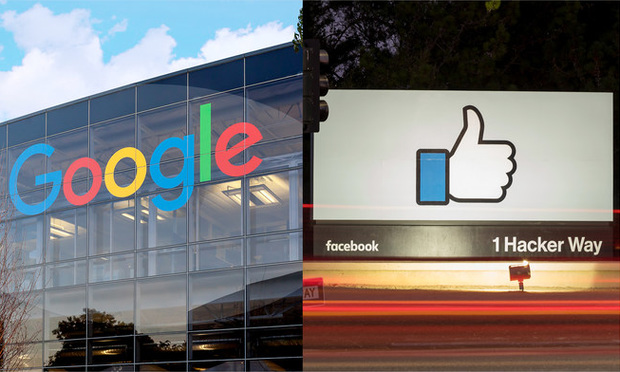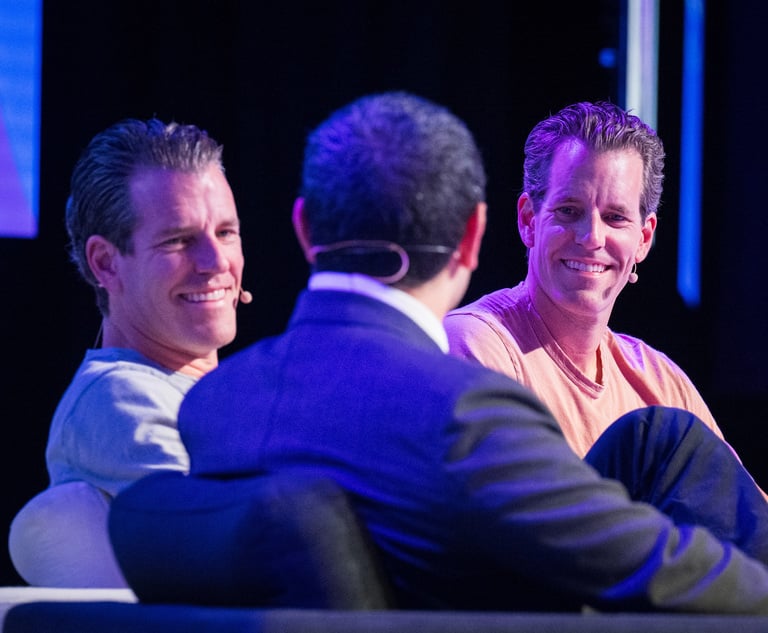Antitrust Regulator in Australia Moves to Reel in Facebook and Google
In a long-awaited report, the Australian government on Friday concluded the Silicon Valley companies wield too much market power and made 23 recommendations for increased regulation designed to curtail their influence.
July 26, 2019 at 03:26 PM
6 minute read
The original version of this story was published on Law.com

Facebook and Google will be hit with tough new laws in Australia as the government seeks to limit their market power, curb their dominance of the online advertising industry, and boost privacy protections for individuals.
A long-awaited report into digital platforms released Friday by the Australian government's antitrust regulator concluded that the companies wielded too much influence over Australia's news and advertising markets, stifling competition, and deprived consumers of control over their personal information.
“The market power of these companies is immense,” said Australia's Treasurer, Josh Frydenberg, after releasing the report. “Make no mistake. These companies are among the most powerful and valuable in the world and they need to be held to account and their activities need to be more transparent.”
The report by the Australian Consumer and Competition Commission was released after an 18-month probe and comes at a time when large tech companies are under fire by governments around the world that are concerned about their increasing influence. On Wednesday, the U.S. Federal Trade Commission announced it was fining Facebook $5 billion for privacy breaches.
The ACCC report makes 23 recommendations designed to protect consumers and advertisers and to restore the balance of bargaining power between news and media companies and the platforms.
Among its recommendations: tougher merger laws to stop the Big Tech firms from swallowing smaller rivals; the sharing of profits the companies make from news media companies' content; and requiring them to seek explicit consent from individuals before collecting their data.
“The ubiquity of the Google and Facebook platforms has placed them in a privileged position. They act as gateways to reaching Australian consumers and they are, in many cases, critical and unavoidable partners for many Australian businesses, including news media businesses,” the report states. “The opaque operations of digital platforms and their presence in inter-related markets mean it is difficult to determine precisely what standard of behaviour these digital platforms are meeting.”
The ACCC's report found Google and Facebook platforms have “substantial market power”—Google in search and search advertising, and Facebook in social media services and display advertising. Both have substantial bargaining power in their dealings with news media businesses in Australia, the report stated.
The commission also found that of every $100 spent by advertisers on online advertising (excluding classified advertising), $47 went to Google and $24 went to Facebook.
The tech companies achieved outsized market power through the acquisition of potential competitors and through their control of data sets, the commission said, adding that they also benefit from default bias because consumers favour the use of incumbents.
The ACCC recommended changing Australia's merger and acquisition laws so that such deals would be approved only after regulators first consider whether an acquisition would result in the removal of a potential competitor and after they evaluate the nature and significance of assets being acquired, including data and technology.
A specialist digital platforms branch of the Commission should be established to monitor and investigate instances of potentially anti-competitive conduct and conduct causing consumer harm, the report said. It also should investigate whether Facebook and Google are charging too much for advertising and whether they are limiting effective competition.
In order to redress the imbalance of bargaining power between news media companies and the digital platforms, each digital platform should develop a code of conduct to ensure “they treat news media businesses fairly, reasonably and transparently in their dealings with them,” the report said.
The codes of conduct would need to be approved by the regulator and would require the sharing of data with news media businesses and require them to share revenue with news media businesses where the digital platform obtains value, directly or indirectly, from content produced by the news media businesses.
As he released the report, Frydenberg highlighted individual privacy as an area of focus for the government.
“There is no option other than to put in place the right regulatory and legislative regime to protect the public's privacy, because what this report finds is that so much personal data is being collected without informed consent. It's an extremely serious issue,” he said.
The Commission recommended the platforms be required to gain “specific, unambiguous and informed” consent from individuals for their data being collected, to notify consumers when their information is being collected, and to enable the erasure of personal information.
The government plans 12 weeks of consultation on the proposed changes and has promised to release new regulations governing digital platforms before the end of the year.
“It is a time of rapid technological change and Australians need a regulatory framework that is fit for purpose and better protects and informs Australian consumers,” Frydenberg said.
Digital industry lobby group DIGI, which represents Google, Facebook and Twitter among other platforms said the government needed to ensure Australia has a thriving technology sector.
“We urge the Australian Government to assess the ACCC's recommendations against an innovation test, closely examining how they will impact Australia's digital industry at large and Australia's global standing as a place to invest in technology,” DIGI managing director Sunita Bose said in a statement.
“We're closely reviewing these recommendations to ensure they don't bring unintended consequences to all digital businesses and the choice of digital products available to Australian consumers,” Bose said.
In a separate statement, Facebook Australia and New Zealand managing director Will Easton said it will take part in the consultation process, but warned: “It is important to get the rules for digital news distribution right, as they could impact the 16 million Australians who use our services to connect, share, and build community, as well as the hundreds of thousands of small businesses that use our free tools to grow, thrive, and create jobs.”
This content has been archived. It is available through our partners, LexisNexis® and Bloomberg Law.
To view this content, please continue to their sites.
Not a Lexis Subscriber?
Subscribe Now
Not a Bloomberg Law Subscriber?
Subscribe Now
NOT FOR REPRINT
© 2025 ALM Global, LLC, All Rights Reserved. Request academic re-use from www.copyright.com. All other uses, submit a request to [email protected]. For more information visit Asset & Logo Licensing.
You Might Like
View All
TikTok Hit With California Class Action for Allegedly Mining Children's Data Without Parental Consent

Apple Disputes 'Efforts to Manufacture' Imaging Sensor Claims Against iPhone 15 Technology

‘Not a Regulatory Gray Area’: CFTC Secures $5M Settlement From Gemini
3 minute readTrending Stories
- 1First-Degree Murder Charge May Not Fit Mangione Case
- 2Legal Tech's Predictions for Legal Ops & In-House in 2025
- 3SDNY US Attorney Damian Williams Lands at Paul Weiss
- 4Litigators of the Week: A Knockout Blow to Latest FCC Net Neutrality Rules After ‘Loper Bright’
- 5Litigator of the Week Runners-Up and Shout-Outs
Who Got The Work
Michael G. Bongiorno, Andrew Scott Dulberg and Elizabeth E. Driscoll from Wilmer Cutler Pickering Hale and Dorr have stepped in to represent Symbotic Inc., an A.I.-enabled technology platform that focuses on increasing supply chain efficiency, and other defendants in a pending shareholder derivative lawsuit. The case, filed Oct. 2 in Massachusetts District Court by the Brown Law Firm on behalf of Stephen Austen, accuses certain officers and directors of misleading investors in regard to Symbotic's potential for margin growth by failing to disclose that the company was not equipped to timely deploy its systems or manage expenses through project delays. The case, assigned to U.S. District Judge Nathaniel M. Gorton, is 1:24-cv-12522, Austen v. Cohen et al.
Who Got The Work
Edmund Polubinski and Marie Killmond of Davis Polk & Wardwell have entered appearances for data platform software development company MongoDB and other defendants in a pending shareholder derivative lawsuit. The action, filed Oct. 7 in New York Southern District Court by the Brown Law Firm, accuses the company's directors and/or officers of falsely expressing confidence in the company’s restructuring of its sales incentive plan and downplaying the severity of decreases in its upfront commitments. The case is 1:24-cv-07594, Roy v. Ittycheria et al.
Who Got The Work
Amy O. Bruchs and Kurt F. Ellison of Michael Best & Friedrich have entered appearances for Epic Systems Corp. in a pending employment discrimination lawsuit. The suit was filed Sept. 7 in Wisconsin Western District Court by Levine Eisberner LLC and Siri & Glimstad on behalf of a project manager who claims that he was wrongfully terminated after applying for a religious exemption to the defendant's COVID-19 vaccine mandate. The case, assigned to U.S. Magistrate Judge Anita Marie Boor, is 3:24-cv-00630, Secker, Nathan v. Epic Systems Corporation.
Who Got The Work
David X. Sullivan, Thomas J. Finn and Gregory A. Hall from McCarter & English have entered appearances for Sunrun Installation Services in a pending civil rights lawsuit. The complaint was filed Sept. 4 in Connecticut District Court by attorney Robert M. Berke on behalf of former employee George Edward Steins, who was arrested and charged with employing an unregistered home improvement salesperson. The complaint alleges that had Sunrun informed the Connecticut Department of Consumer Protection that the plaintiff's employment had ended in 2017 and that he no longer held Sunrun's home improvement contractor license, he would not have been hit with charges, which were dismissed in May 2024. The case, assigned to U.S. District Judge Jeffrey A. Meyer, is 3:24-cv-01423, Steins v. Sunrun, Inc. et al.
Who Got The Work
Greenberg Traurig shareholder Joshua L. Raskin has entered an appearance for boohoo.com UK Ltd. in a pending patent infringement lawsuit. The suit, filed Sept. 3 in Texas Eastern District Court by Rozier Hardt McDonough on behalf of Alto Dynamics, asserts five patents related to an online shopping platform. The case, assigned to U.S. District Judge Rodney Gilstrap, is 2:24-cv-00719, Alto Dynamics, LLC v. boohoo.com UK Limited.
Featured Firms
Law Offices of Gary Martin Hays & Associates, P.C.
(470) 294-1674
Law Offices of Mark E. Salomone
(857) 444-6468
Smith & Hassler
(713) 739-1250







